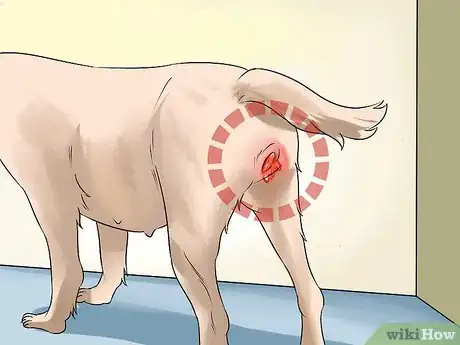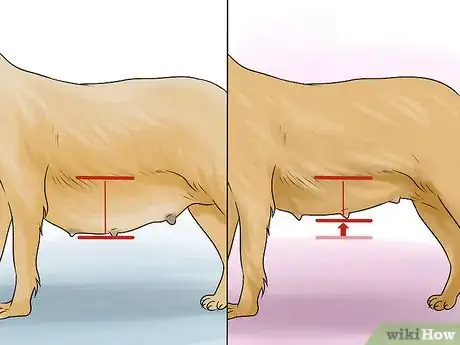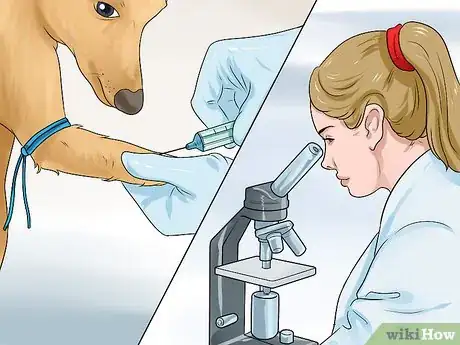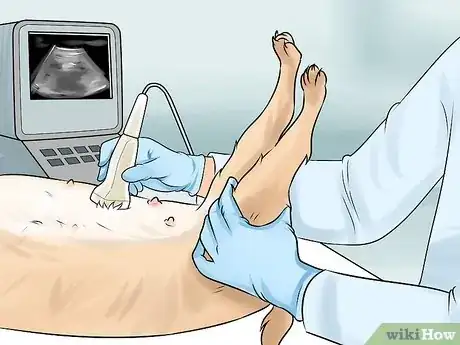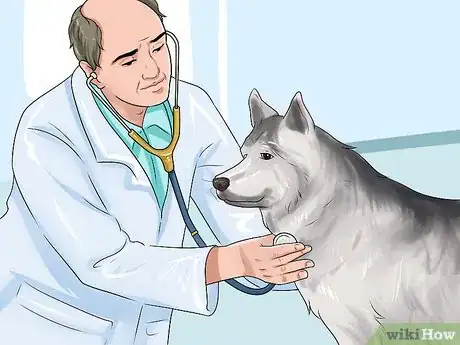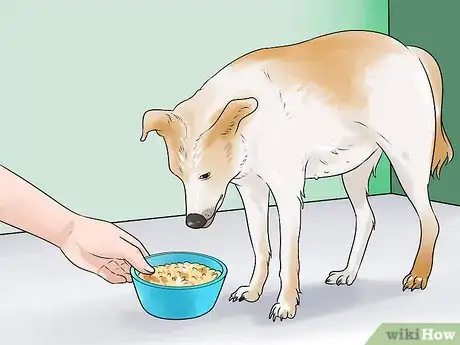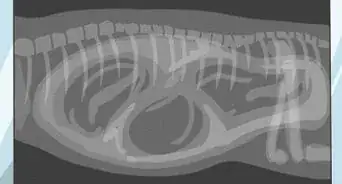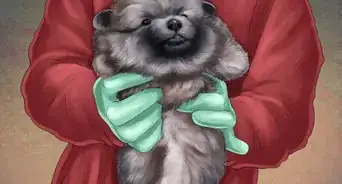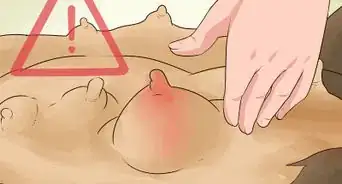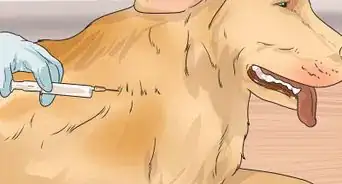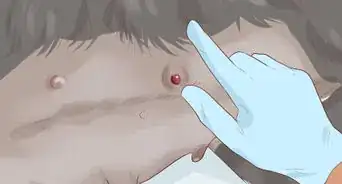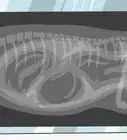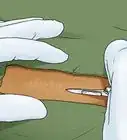This article was co-authored by Kinsey Moses. Kinsey Moses is a Dog Breeder and the Co-Founder of Haystack Mountain Bernedoodles in Mead, Colorado. With 20 years of experience between her, her husband Sam, and her mother, they specialize in ethical and premium dog breeding, which prioritizes the health, conformation, and upbringing of each dog in their program. Kinsey earned her Bachelor's degree in Integrative Physiology from the University of Colorado Boulder, and her husband Sam holds a BS in Kinesiology from San Diego State University and a Master's in Applied Exercise Science from Concordia University Chicago.
This article has been viewed 131,161 times.
Fetal reabsorption occurs when a pregnant dog miscarries early in a pregnancy. The fetal material is reabsorbed back into the dog's body instead of exiting it while other fetus' may go on to develop properly.[1] This is unlike a miscarriage later in pregnancy, in which the fetus will exit the body eventually due to the formation of bones that cannot be reabsorbed. In general, it may be hard for you to know when fetal reabsorption has occurred, especially if it happens before you knew the dog was pregnant. However, if you know your dog is pregnant there are some signs that your dog has miscarried one or more of the fetus' it is growing.
Steps
Identifying Signs of a Miscarriage
-
1Look for bleeding. The most common symptom of a miscarriage is bleeding and discharge from the vagina. This bleeding can be slight or dramatic, depending on how big the fetus was and how many fetus' were miscarried.[2]
- Even bleeding may be hard to spot, as many dogs will clean up the blood themselves before you spot it. However, if you know your dog is pregnant, keep an eye out for bloody discharge.
-
2Pay attention to the rate of stomach growth. If your dog is pregnant, its belly should grow at the puppies develop. If the belly of your pregnant dog is not growing, it may have lost one or all of its puppies.
- A dog that has lost a pregnancy may even lose weight instead of gaining it.
- The usual gestational period of a dog is 63 days.[3] Your pregnant dog's belly should grow dramatically during this time.
Advertisement -
3Assess whether the dog has risk factors or medical issues that could cause miscarriage. There are some reasons that your dog may miscarry. If your dog has any of these issues, then it is more likely that she may have miscarried. Some factors that may induce a miscarriage include:[4]
- Infectious diseases, such as Salmonella, Brucella canis, canine Herpes, Parvovirus, or Toxoplasma.
- Trauma
- Uterine infection
- Hormonal problems
- Medications that promote miscarriage, such as chemotherapeutic drugs, chloramphenicol, oestrogen, or high dose steroids
-
4Get an ultrasound or X-rays. If you suspect that your dog may have lost a fetus, you should have it looked at by a veterinarian. Your veterinarian may elect to do an X-ray or ultrasound exam to look at the fetus' developing in the dog.
- If your dog has already had an X-ray or ultrasound to document the pregnancy, you should be able to assess whether all of the fetus' that were in the uterus are still present.
Caring For a Pregnant Dog After Miscarriage
-
1Get your dog veterinary care. After your dog reabsorbs a fetus it should be looked at by a veterinarian. The veterinarian can assess the dog's health, as well as the health of any additional fetus'. Your dog may need to be kept under observation to make sure that it can successfully carry the remaining fetus'.
- There are a variety of reasons that your dog may have miscarried. A veterinarian may be able to figure out the reason why.
- In some cases, a miscarriage occurs due to a infectious disease. Your veterinarian may need to do biological tests to confirm what type of infection caused the miscarriage. If this is the case with your dog, it will need veterinary care to recover from the infection.[5]
-
2Understand that many times miscarriages are not preventable. There are many reasons that your dog may miscarry that you have no control over. For example, many miscarriages are due to hormonal imbalances in the dog's system or infectious diseases that have gone undiagnosed. [6]
- Keep this in mind when dealing with your dog and coming to grips with the loss of a potential puppy. The miscarriage is not your fault or the fault of your dog.
-
3Continue to give your dog prenatal care. Even if your dog has reabsorbed a fetus, there still may be additional developing fetus' that need to be cared for. In order for your dog to successfully carry these puppies to term, you need to continue proper care for the dog.
- This includes feeding your pregnant dog properly, getting it proper healthcare, and preparing properly for labor and delivery.
Expert Q&A
-
QuestionHow do you know if a dog absorbed puppies?
 Kinsey MosesKinsey Moses is a Dog Breeder and the Co-Founder of Haystack Mountain Bernedoodles in Mead, Colorado. With 20 years of experience between her, her husband Sam, and her mother, they specialize in ethical and premium dog breeding, which prioritizes the health, conformation, and upbringing of each dog in their program. Kinsey earned her Bachelor's degree in Integrative Physiology from the University of Colorado Boulder, and her husband Sam holds a BS in Kinesiology from San Diego State University and a Master's in Applied Exercise Science from Concordia University Chicago.
Kinsey MosesKinsey Moses is a Dog Breeder and the Co-Founder of Haystack Mountain Bernedoodles in Mead, Colorado. With 20 years of experience between her, her husband Sam, and her mother, they specialize in ethical and premium dog breeding, which prioritizes the health, conformation, and upbringing of each dog in their program. Kinsey earned her Bachelor's degree in Integrative Physiology from the University of Colorado Boulder, and her husband Sam holds a BS in Kinesiology from San Diego State University and a Master's in Applied Exercise Science from Concordia University Chicago.
Dog Breeder The noticeable signs of miscarriage will usually occur in the last two weeks of pregnancy. Before then, mothers will usually just reabsorb the puppies, which isn’t as acutely clear. The signs of miscarriage are often lethargy, fever, and the mother not wanting to move or eat, which is then followed by vaginal a greenish brown discharge. It's always a good idea to take the dog to the vet in cases such as this.
The noticeable signs of miscarriage will usually occur in the last two weeks of pregnancy. Before then, mothers will usually just reabsorb the puppies, which isn’t as acutely clear. The signs of miscarriage are often lethargy, fever, and the mother not wanting to move or eat, which is then followed by vaginal a greenish brown discharge. It's always a good idea to take the dog to the vet in cases such as this.
Expert Interview
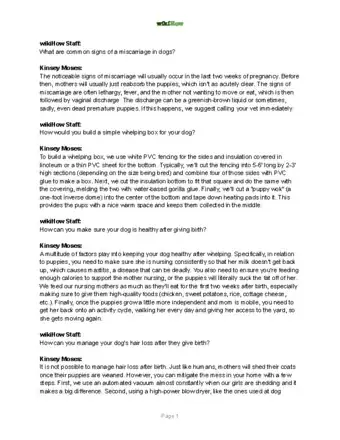
Thanks for reading our article! If you'd like to learn more about taking care of dogs, check out our in-depth interview with Kinsey Moses.
References
- ↑ https://www.vetinfo.com/dfetsorb.html
- ↑ http://www.petmd.com/dog/conditions/reproductive/c_dg_spontaneous_abortion_pregnancy_loss
- ↑ http://www.akc.org/content/dog-breeding/articles/how-long-are-dogs-pregnant/
- ↑ http://www.lowchensaustralia.com/breeding/lostpregnancy.htm
- ↑ http://www.highstreeteppingvetclinic.com/pregnancy-loss.pml
- ↑ http://www.highstreeteppingvetclinic.com/pregnancy-loss.pml
About This Article
It can be very difficult to tell if a pregnant dog has reabsorbed the fetus it was carrying. Look for common signs of a miscarriage, like bleeding from the dog’s vagina. You may also notice that the dog’s stomach isn’t growing, or she may even lose weight after a miscarriage. If you suspect this has occurred, take your dog to the vet to get an X-ray or an ultrasound to ensure your dog’s health, as well as the health of any fetuses she may still be carrying. Keep reading for advice from our Veterinary co-author on how to care for your dog after a miscarriage!
